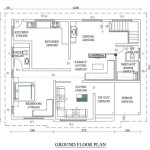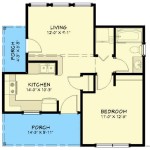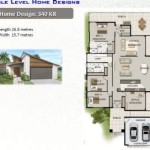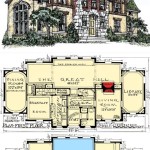Essential Aspects of Simple House Floor Plan With Measurements
Designing a simple house floor plan with measurements is a crucial step in the home-building process. A well-planned floor plan ensures an efficient and functional living space that meets your needs. Here are some essential aspects to consider when creating a simple house floor plan with measurements:
1. Determine Your Needs and Lifestyle
Before you start drawing up a floor plan, take some time to reflect on your lifestyle and needs. Consider the number of bedrooms and bathrooms you require, as well as any specific spaces you might need, such as a home office, playroom, or storage area. Think about how you and your family will use the space and what kind of layout would work best for you.
2. Establish a Budget
Your budget will play a significant role in determining the size and complexity of your floor plan. Determine how much you can afford to spend on the construction and materials. Keep in mind that larger floor plans and more intricate designs typically cost more.
3. Choose a Floor Plan Layout
There are several different floor plan layouts to choose from, including single-story, multi-story, open-concept, and traditional. Consider the advantages and disadvantages of each layout and select the one that best suits your needs and preferences.
4. Determine Room Sizes and Measurements
Once you have chosen a floor plan layout, it is time to determine the size and measurements of each room. Use a measuring tape or digital measuring device to accurately determine the dimensions of your available space. Consider standard room sizes and ensure that there is adequate space for furniture, appliances, and circulation.
5. Plan for Windows and Doors
The placement of windows and doors is essential for natural light, ventilation, and access. Consider the orientation of your home and the amount of sunlight you want in each room. Plan for windows that provide ample natural light and doors that allow for convenient flow between rooms and outdoor spaces.
6. Designate Specific Areas
In addition to the main rooms, consider designating specific areas for activities such as cooking, dining, laundry, and storage. Plan for a kitchen with adequate counter space, appliances, and storage. Designate a dining area that can accommodate your desired number of guests. Include a laundry room with space for a washer and dryer, and provide ample storage throughout the house for belongings.
7. Consider Energy Efficiency
When designing your floor plan, consider incorporating energy-efficient features to reduce utility costs and minimize your environmental impact. Orient the house to take advantage of natural light and heat gain. Plan for proper insulation, high-efficiency windows, and energy-efficient appliances to enhance the home's energy performance.
8. Seek Professional Help if Needed
If you are not comfortable designing a floor plan on your own, consider hiring a professional architect or designer. They can help you create a customized floor plan that meets your specific needs and requirements. Professional designers have the expertise to ensure that your floor plan is functional, efficient, and aesthetically pleasing.
By following these essential aspects, you can create a simple house floor plan with measurements that meets your needs, fits within your budget, and provides a comfortable and functional living space for you and your family.
12 Examples Of Floor Plans With Dimensions

Floor Plan With Dimensions 1 One House Plans Bungalow Cottage

Simple House Plans Blog Homeplans Com

2 Story House Floor Plans With Measurements Inspiring High Quality Simple 3 Two Modern Garage

Est House Plans To Build Simple With Style Blog Eplans Com

Stylish And Simple Inexpensive House Plans To Build Houseplans Blog Com

Simple House Plans Blog Homeplans Com

Stylish And Simple Inexpensive House Plans To Build Houseplans Blog Com

Floor Plans With Dimensions Including Examples Cedreo

Low Budget Simple House Design Plans For Builders Blog Builderhouseplans Com








